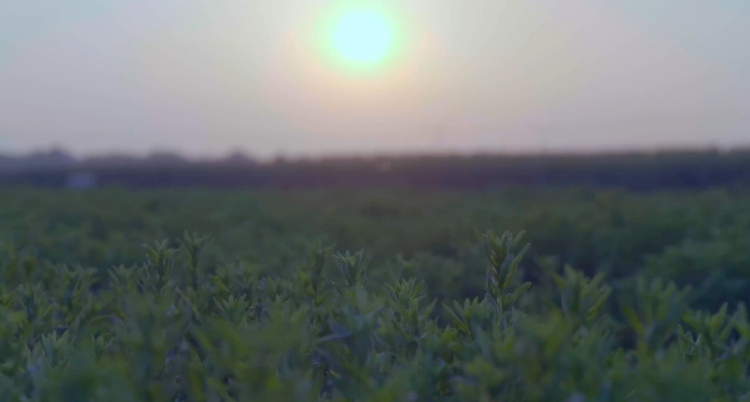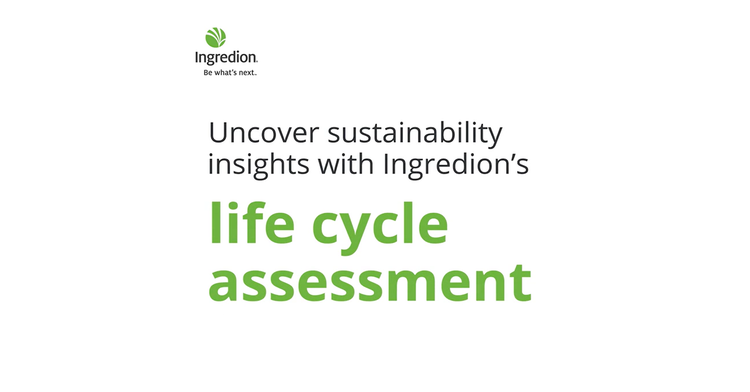
Reducing sugar sustainably
Ingredion's 2022 Sugar Reduction Life Cycle Assessment
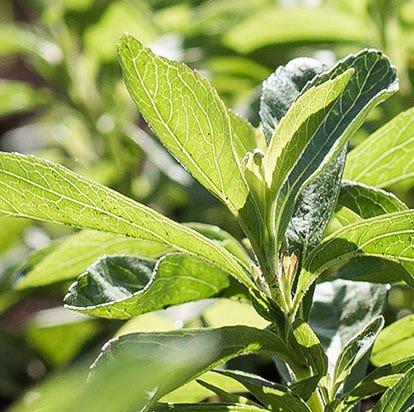
Stevia enables food and beverage companies to achieve sustainable sugar reduction
For consumers around the world, brands’ sustainability initiatives are now a key factor when it comes to making a purchase decision, with many shoppers actively seeking out brands that take an active stance on environmental issues:
- 66% of consumers believe brands should be doing more to protect the planet 1
- 74% of consumers look for carbon footprint initiatives, and 72% look for global warming initiatives 1
- One in two consumers have made changes to their diets in the past two years in order to lead a more sustainable lifestyle 1
To compete for new generations of increasingly conscientious consumers, food and beverage companies must now focus on using ingredients that use less while also having more to offer. For companies looking for a better-tasting alternative to previous stevia generations and that are formulating for sustainability and sugar reduction, Ingredion’s Sugar Reduction Life Cycle Assessment (LCA) proves that Reb M stevia offers a consistently sweet deal.
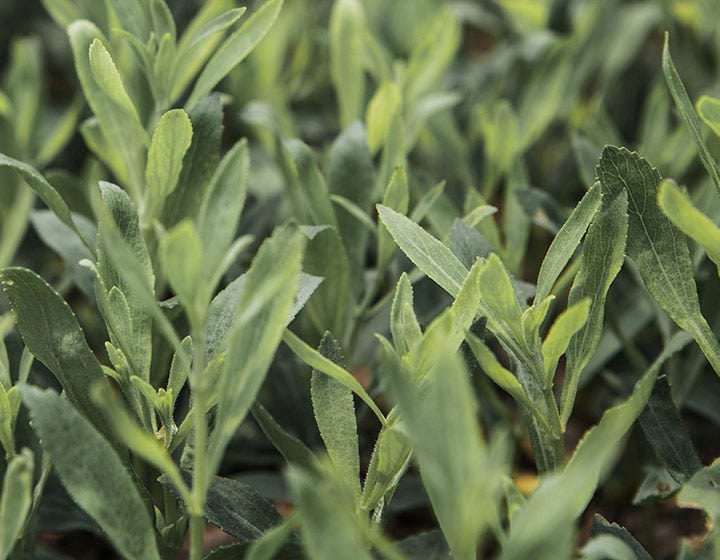
Explore sustainability in sugar reduction
Our sweetener sustainability calculator helps formulators determine the potential environmental impacts of various sweeteners in a food or beverage application. Tell us about your product, choose between ingredients and download our sustainability checklist to see which sweetener may be right for you.
Stevia Sustainability Program
Webinar: Achieve sustainable sugar reduction
Ingredion’s application knowledge and comprehensive portfolio can help you create great-tasting products without all the sugar and advance your brand’s sustainability goals.

Listen to what the experts say
Stevia offers more to formulators by using less
Our LCA compares the environmental impacts of several common sweetening solutions like sugarcane, high-fructose corn syrup and beet sugar, and contrasts them with the environmental impacts of multiple stevia technologies (e.g., stevia leaf extraction, bioconversion and fermentation) and ingredients (Reb M and Reb A). The data was analysed to determine the relative levels of sustainability of each — and show stevia’s vast potential for reducing environmental impact.
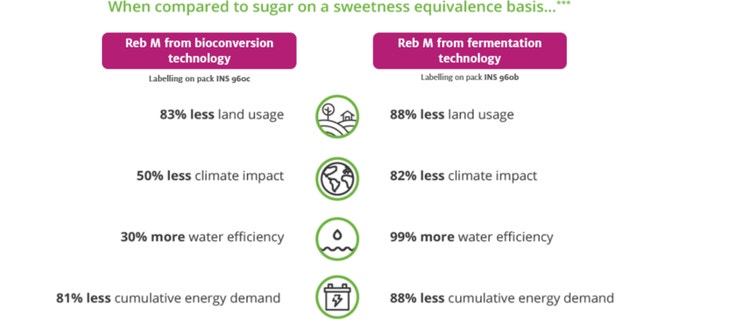
The complete, peer-reviewed Sugar Reduction LCA contains detailed information on our findings and research methods. Contact us now to begin your sustainability journey with the industry’s most complete portfolio of stevia products.
Our commitment to sustainability
Looking for a global ingredient company with planetary sensibilities? From our portfolio of plant-based, natural and sustainable ingredients to our 2030 All Life plan, see how Ingredion is committed to bringing the potential of people, nature and technology together.
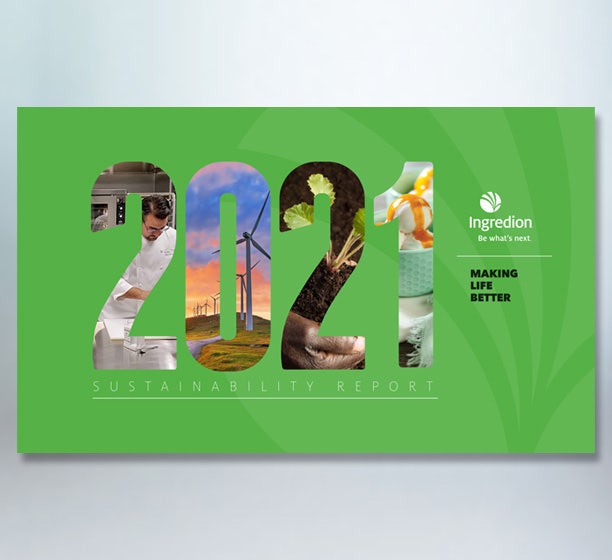
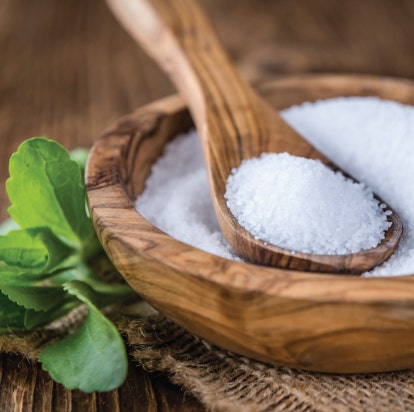
PureCircle™ by Ingredion
The only stevia supplier to offer all major stevia production technologies, PureCircle™ by Ingredion is our in-house source of sugar-reduction solutions and innovation. Learn how our innovative extraction technologies make Reb M readily available for brands of all sizes.
The need for sustainable sugar reduction
Modern stevia production technologies have changed the sugar reduction landscape, with options like PureCircle™ by Ingredion’s Reb M stevia delivering superior taste and sustainability compared to stevia solutions of the past. For many food and beverage manufacturers, these advancements are taking on new importance in positioning brands for today’s environmentally conscious consumers.
More people are seeking out food and beverage brands that care about sustainability, and they want products that both taste good and are better for them. Stevia’s naturally intense sweetness and potential for reducing environmental impact in food and beverage formulations makes it an ideal solution to tackle these challenges head-on.
For manufacturers curious about using stevia to reduce sugar and enhance sustainable appeal, Ingredion’s recently published Sugar Reduction Life Cycle Assessment (LCA) provides a comprehensive, verified and internationally accepted way to quickly get up to speed:
- Consumers look for brands that take a stance — 66% of consumers globally believe brands should be doing more to protect the planet,
- 74% look for carbon footprint initiatives and 72% look for global warming initiatives 1
- Stevia sweeteners are more sustainable — The LCA shows stevia outperforms sugar and other common sweetening alternatives across several sustainability metrics, largely thanks to innovations in stevia production
- There’s a growing sustainability potential — Because stevia produces sweetness at a similarly high intensity of traditional sweeteners with significantly less inputs, stevia not only drives mass market adoption, but also contains vast potential to reduce environmental impact through sustained and widespread use
- Ingredion has the ingredients, solutions and expertise to help brands grow — PureCircle™ by Ingredion is the only stevia supplier to offer all major stevia production technologies and is vertically integrated from seedling to finished product, further reducing environmental impact
Uncovering stevia’s sustainability story
Ingredion’s experts in sugar reduction and specialty sweeteners are eager to help our customers understand and maximise the benefits of our comprehensive stevia portfolio. Our Sugar Reduction LCA was commissioned with the understanding that reducing sugar has become integral to our customers’ success stories. As our stevia ingredients continue to drive brand growth and support healthy lifestyles, the LCA now also offers a wealth of data our customers can use to bring a whole new realm of sustainable products to consumers.
In accordance with Ingredion’s own commitment to sustainability and our 2030 All Life plan, the Sugar Reduction LCA quantifies the potential of Reb M stevia for reducing environmental impact when used in food and beverage formulations. Here’s what it means and why it matters for F&B manufacturers.
What is a Life Cycle Assessment?
A life cycle assessment, or LCA, quantifies the cumulative environmental impacts of a particular product from its raw materials to the moment it is used or consumed. Our Sugar Reduction LCA measures the potential impacts of the Reb M stevia molecule (either leaf-extracted, bioconverted or fermented) in four key areas: climate change, land use, water scarcity and cumulative energy demand. All inputs and outputs of the product’s “cradle-to-grave” lifecycle, including raw materials, manufacturing, packaging, distribution, use and disposal are factored in.
How is the Sugar Reduction LCA different from other life cycle assessments?
Ingredion’s Sugar Reduction LCA is peer reviewed and International Organization for Standardization (ISO)-compliant. While not all LCAs take these additional steps, we have done so to ensure and emphasise the reliability of our data. It is our hope that going above and beyond will set an important standard in our industry and provide a guidepost that informs our customers’ decision-making processes.
Why do LCAs matter?
In addition to moving the needle toward a more sustainable future, LCAs are important for their ability to address the needs of manufacturers in an increasingly complex social and regulatory environment. LCAs like this help them evaluate sustainability potential of a given product and then make informed decisions for how adoption can fuel innovation and impact the bottom line.
Stevia’s impressive environmental potential
The LCA was performed by comparing the potential impacts of multiple sweeteners. Relative quantities of sweetener were evaluated according to a sweetness equivalence to one kilogram of white sugar. Our research compares Reb M stevia life cycle data against data for cane sugar, beet sugar, high-fructose corn syrup and leaf-extracted Reb A stevia. We then determine the relative levels of sustainability of each — and show stevia’s vast potential for reducing environmental impact.
According to the analysis, stevia outperformed all traditional sugars, with fermented Reb M showing the least potential for relative impact across all key areas of measurement:
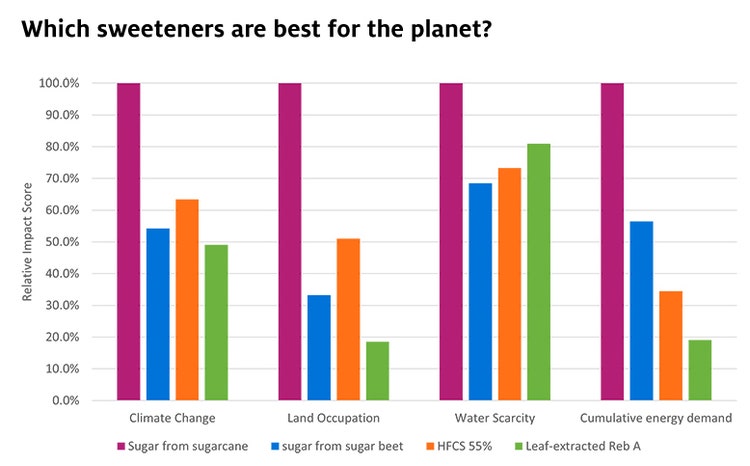
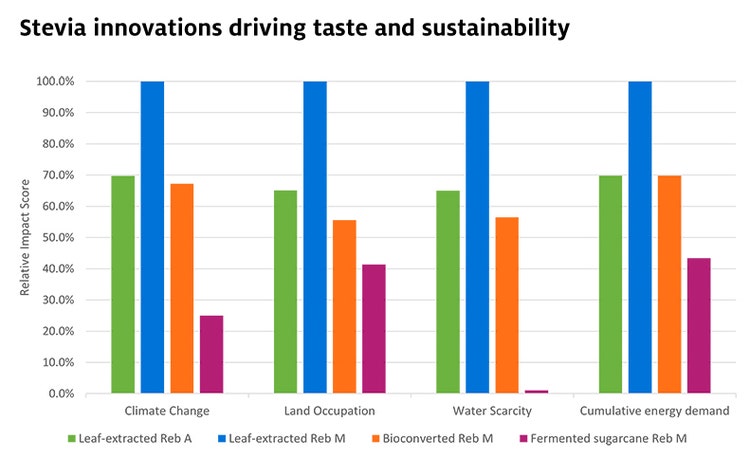
Elevate your message with sustainable sweeteners
With both better-for-you and better-for-our-planet benefits at the forefront of the purchase decision, food and beverage companies are being held more accountable than ever before when it comes to promoting ingredients that add holistic value.
Our Sugar Reduction LCA shows Reb M stevia’s potential to change the game for manufacturers seeking to add a sustainable claim to their reduced-sugar products — and PureCircle™ by Ingredion’s comprehensive stevia portfolio, including great-tasting sustainable fermented sugarcane Reb M is a great place to start.
Review the Sugar Reduction LCA to get the full story, and then contact our experts to start your own journey to sustainable success.
Let’s make your goals a reality
As experts in taste, texture and sensory science, Ingredion can help you make your brands healthier while still delivering the same eating experience your consumers love.
1The road to sustainability, FMCG Gurus, 2022 *Global consumers
